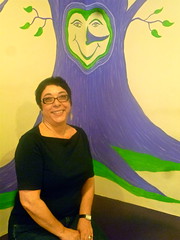For every East Village business that’s opening or closing, dozens are quietly making it. Here are two of them: Village Kids and Foot Gear Plus.
While in high school, Tony Scifo worked part-time for a shoe guy. In 1980, at the tender age of 19, he bought Foot Gear, the shoe shop across the street at 131 First Avenue. Two and a half years ago, he and his big sister Linda Scifo-Young opened Village Kids, selling children’s kicks just a block away at 117 First Avenue. Ms. Scifo-Young used to work in corporate real estate, so she wasn’t scared of going into business during a financial crisis. “As a real estate broker, I knew that the only time I could get a decent lease for the second store was when the market was bad,” she said. The Local spoke to her at Village Kids about whether her gamble paid off.
What influences your business the most?
The funny thing is that in actuality we’re in the weather business. If the weather cooperates, we’re good. If it’s cold when it’s supposed to be cold, then we have a good season. If it’s hot when it’s supposed to be hot, then we have a good season. If any of those things don’t work, you have no season. This year was hard with how the weather cooperated.
Why do you have two stores in two spaces a block from each other?
Village Kids is an extension of the other store. Had Foot Gear been big enough to house a children’s section we would have done it that way. But in a way, I’m glad it didn’t work out that way because children need their own space and parents need their own space with their children. Adults really don’t want to buy shoes with little kids screaming and running around.
Why don’t you have a website?
We had a website at one time when we were selling shoes online for the big store for people who wanted to buy them as a gift. But you just can’t compete with the Zappos of the world. They let you return the shoes 365 days later. We don’t have that luxury. We don’t have inventory that deep. We might have a couple thousand pairs of shoes in total. Those companies might have 50,000 pairs in stock. You really need to try on the shoe. Just because you’re a size 8 doesn’t mean you’re a size 8 in every shoe, in every company. You really need to come into the store and try stuff on.
How has your inventory changed over the decades at the bigger store?
When we started in 1980 our most expensive shoe was $60. Today we have $250 shoes. At [Village Kids] the least expensive shoe is a $17 flip-flop. The most expensive shoe now is probably a $50 sandal. In the winter my shoes are anywhere from $35 for athletic to maybe an $80 boot.
How is it to work with your little brother?
My brother is a wonderful, generous man, but he’s still a man! Every once in a while I have to remember not to bruise the ego too much. But he’s a great guy and I couldn’t have a better partner.
Reflecting on these two and a half years in this economy, how do kids shoes sell?
Probably 20 percent of my inventory is light-up shoes and 30 percent is girls’ glitter shoes. Glitter, fancy really sells the best. The themed glitter, princess stuff we sell out of always. 45 percent of our product then is left for athletic.
Looking back on two recessions, which years really were the scariest as a small business owner?
The 90s were scary and the same with the latter part of the 00s. Otherwise, we’ve been pretty consistent the last ten years. Very little lost and not much gain, but we have stability.
I’m sure there can be some pretty intense days when your clientele are children with moods and tempers.
You get the temper tantrums and the running around. At one time we had videos and cartoons in here and then we got parents who told us they don’t allow their children to watch TV so we stopped.
What’s your rent now and what was it when you started.
When we started over there, we were paying $1,350 a month over at Foot Gear. Today we’re paying a lot more. We’re a triple-net lease tenant there so by the time you pay insurance, rent, real estate taxes, water, it probably costs about $16,000 a month. So I’ve got to sell a lot of shoes.
How is that going?
We hold our own. It’s getting harder every day. A triple-net lease means we’re spending a lot more money. Village Kids, we got a decent lease. It’s in the $5,000 to $6,000 range.
With two stores now, what’s next?
Tony’s children are now the next generation. If any of them decide to take it to the next level, it would be nice to have our own label and manufacture. That’s my dream. I have a ten-year lease here and we still have time there and will be looking to renew there. We’re a victim of real estate, as a business. A landlord doesn’t have to renew you like a residential lease. In a commercial lease he can say OK, it’s time to go.




